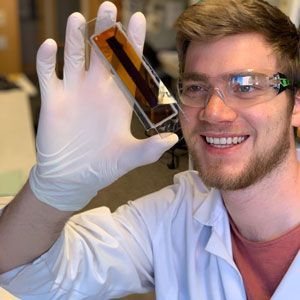
🌞 Solar cells for indoor use can replace batteries in future sensors
Solar cells developed to operate in low light can give us new opportunities to use indoor lighting to power sensors.
Share this story!
In five years, researchers expect that there will be 75 billion sensors connected to the Internet. It's what's called the Internet of Things, IoT. One challenge here is to supply all these sensors with electricity.
Using batteries is not optimal. They must be changed at regular intervals and have a negative environmental impact. Solar cells are a better choice, but today's solar cells are made to function optimally in strong sunlight. Many of the sensors will sit indoors, so the solar cells are not efficient enough.
But now researchers from Uppsala University have developed solar cells especially for indoor use. The new solar cells use a technology that allows them to use light from fluorescent lamps and LEDs more efficiently. In addition, the Uppsala researchers, together with a research team from Munich, have shown how it is possible to build sensors that adapt their electricity consumption to how much light there is.
“Solar cells developed for optimum properties in low light intensity initiate a new chapter for sensor electronics. We can finally use an energy source that so far has hardly been touched. The combination of high efficiency, low costs and non-harmful materials is the key to sustainable IoT networks, "says Marina Freitag, one of the researchers behind the new technology.
The technology is based on a type of dye solar cells based on an electrolyte with copper complexes. In experiments, cells have succeeded in converting 34 percent of visible light into electricity.

“By knowing the spectrum of light in which the sensors will be placed, we can select dyes that absorb these particular wavelengths. Then the solar cells convert a greater amount of energy than if you have statically developed solar cells. At the same time, the solar cells maintain a high voltage, which is very important when operating electronic devices, ”says Marina Freitag.